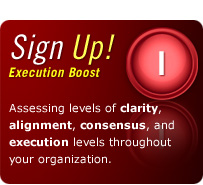April 12th, 2007
by Dr. Brian Higley |
I’m actually not going to write anything about Self-Mastery here. Before you click away from this article in disgust, let me first tell you why I’m not writing about it and what I’m doing instead. I’ve heard so many leaders say “I know, I know” when someone recommends consistently prioritizing their goals and activities – and continuously fail to do consistent prioritization – that I’ve learned that writing/talking about it isn’t all that helpful to anyone.
So, instead of writing/talking about it more, our team has created a system to assist leaders in actually doing the things that will help them to increase their Self-Mastery. We call this the “Self-Mastery Boost Support System (SBSS).” For a free sample of the first 15-minute assessment in this system, click here and follow the instructions carefully.
To learn more about this system, feel free to contact me at BrianH@TBB2Excellence.com.
Click here to view full Self-Mastery article
April 12th, 2007
by Dr. Brian Higley |
“Self-Mastery” is a concept that is repeatedly recommended as essential to leadership excellence. Our firm recently polled over 80 individuals – from CEO’s at a Fortune 500 level to high-functioning college students working at internships – on their opinions of their own levels of Self-Mastery. We found some very interesting results and wanted to share them in hopes of: (a) facilitating a robust conversation about Self-Mastery and (b) helping individuals conceptualize what Self-Mastery is, why it is so important, and how to move toward increasing it.
(more…)
April 12th, 2007
by Dr. Brian Higley |
Having covered our definition of Self-Mastery, let’s turn to the results of our recent Self-Mastery poll. We had a variety of people in a variety of different roles chime in. Forty-eight participants identified themselves as “leaders” (those who are often involved in strategic planning), 24 individuals identified as “managers” (often involved with organizing others toward executing plans), and 17 individuals identified as “employees” (often involved in executing plans) – with 6 individuals identifying themselves as fulfilling multiple roles.
We also had a variety of different responses in relation to how long participants were at their current positions within their current organizations, with about 25% of the individuals reporting being in their current positions and at their current organizations for under 1 year, 50% of the individuals reporting being at their current organizations and in their current positions between 1-10 years, and 25% reporting being at their current positions in their current organizations for over 10 years.
Click here to view full Self-Mastery article
April 12th, 2007
by Dr. Brian Higley |
I’ve been asked multiple times about Self-Mastery: for the past 10 years, our firm has been studying the strongest factors associated with Self-Mastery and training individuals in how to attain more of it. Of course, in order to study a concept, it is important to define that concept first. Self-Mastery, to us, is the ability to exhibit strong influence over one’s thoughts, feelings, and behaviors.
Many people we’ve talked to use the term “control” of self when talking about Self-Mastery (instead of our preferred term: “strong influence” with one’s self). The way we see it, complete control over one’s thoughts, feelings, and behaviors would make one robot-like, while being able to strongly influence ourselves on a regular basis allows for both Self-Mastery and spontaneous, creative, “uncontrolled” thoughts, emotions and behaviors. Complete control over oneself, we think, would make for a boring, restricted life!
Click here to view full Self-Mastery article


